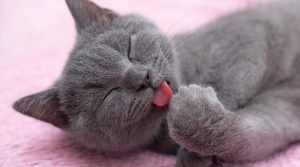Living with cats means embracing their unique personalities and behaviors. One universal habit among cats is their love for licking. Cats spend hours a day grooming themselves or others. Their tongues have tiny, hollow spines called papillae that aid in self-cleaning. But why do they groom, why do they lick you, and when is it too much? Let’s explore.

7 Common Reasons Cats Lick Themselves
Why Cats Lick Themselves
-
Self-Grooming and Bonding with Other Cats Cats dedicate nearly 25% of their time to grooming. This behavior helps them:
-
Keep their fur clean
-
Remove odors
-
Shed loose hair
-
Distribute protective oils
-
Stay cool They also groom other cats to bond and clean hard-to-reach areas.
-
-
Managing Unexpected Situations When things don’t go as planned, like a missed jump, cats may lick themselves. This can indicate worry or confusion and a need to regroup.
-
Addressing Health Issues Excessive licking may signal medical problems like oral or digestive disorders, skin irritation from allergies, or pain from conditions like anal sac impaction. Parasites like fleas can also cause licking. Conversely, a sudden stop in grooming may indicate illness.
-
Socializing Cats groom each other to establish a group scent, helping them recognize pack members.
-
Self-Soothing Licking has a calming effect, helping cats manage stress and conflicts.
-
Cooling Down In hot weather, licking adds moisture to their fur, which evaporates to cool them.
-
Marking Territory Licking spreads their scent, marking their territory and creating a sense of safety.
What Does It Mean When Cats Lick You?
Mother cats lick kittens to clean them and provide security. Similarly, when your cat licks you, it’s a sign of acceptance and family bonding. You can reciprocate with pets, brushing, or playtime.
When Licking Becomes Excessive
If your cat licks excessively, it could indicate stress, anxiety, pain, allergies, parasites, fungal infections like ringworm, or hyperesthesia syndrome. Excessive licking may lead to bald spots or skin damage.
How Vets Can Help
-
For Allergies and Infections: Treatments target the underlying cause of itching.
-
For Medical Conditions: Additional testing and treatment for issues like hyperthyroidism or pain.
-
For Stress: Environmental changes or medications like fluoxetine.
-
For Hair Loss and Skin Damage: Infection prevention, antibiotics, or protective collars.
-
For Hairballs: Remedies to manage excess fur and regular brushing.
Understanding your cat’s licking behavior can help ensure their health and happiness. Keep an eye on their habits and consult a vet if something seems off.
